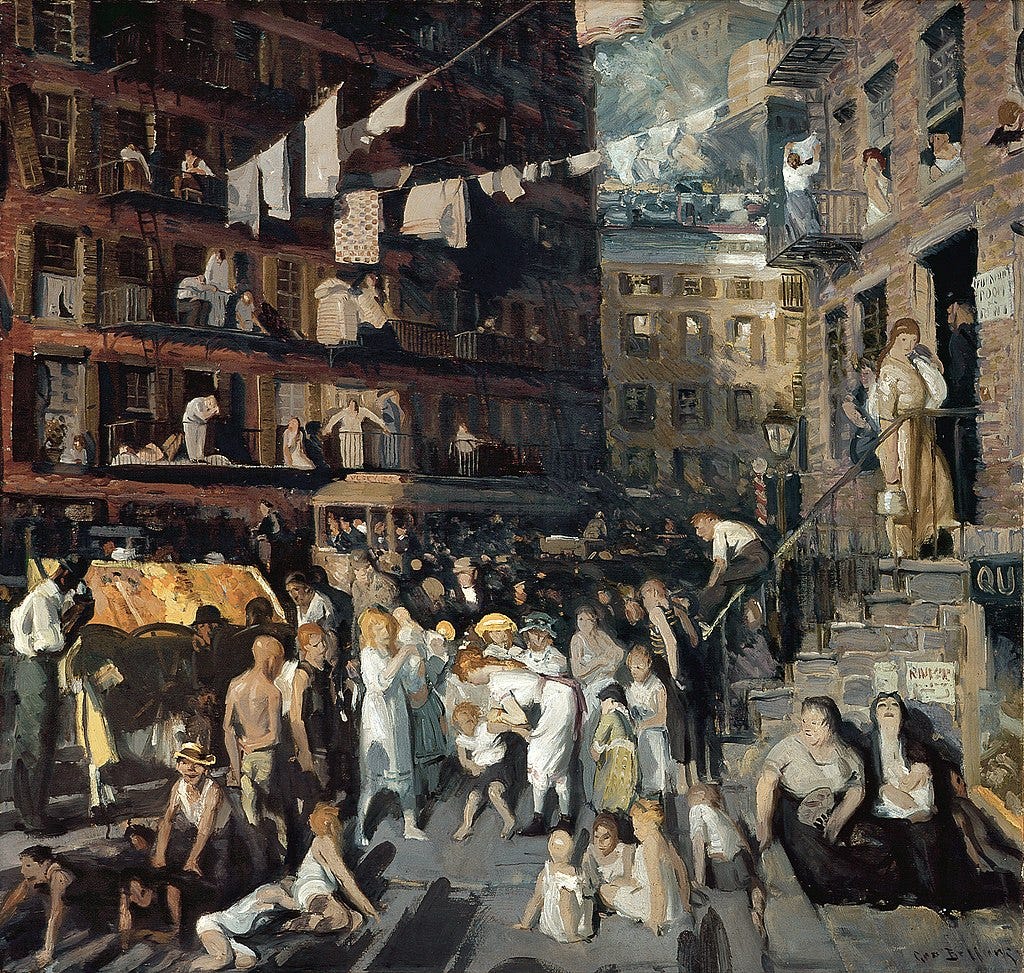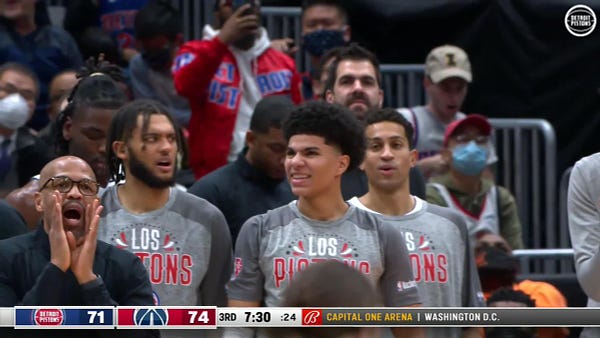How to unleash the WNBA: kill the salary cap and decentralize the structure
Why does the league insist on being wed to traditional American pro sports ideals?
Good morning. Let’s basketball.
Cliff Dwellers, George Bellows, 1913
Friend-of-GMIB Howard Megdal has a huge scoop in Sports Illustrated: the WNBA fined the New York Liberty $500,000 and booted its representative from the league’s executive committee over … charter flights and a midseason owner-paid trip to Napa Valley for the team. The league reportedly floated a $1 million fine and loss of draft picks for the violations. There was a threat that the Liberty would be kicked out of the league entirely. (An empty threat, mind you.)
The WNBA is a strictly capped league, similar to the NBA and NFL. Teams are limited in terms of compensation for their team in total and to individual players. Under the league’s collective bargaining agreement with the players’ union and its bylaws governing teams, charter flights are not allowed. Why? Less generous or wealthy team owners have historically been unwilling to pay for them. So no one can.
This is the problem right now for the WNBA, one that Megdal digs into with on-the-record quotes from the owners willing to pony up. There’s new energy and new resources available in and around women’s sports, but the league’s conservative mindset is keeping it closed off to lots of potential growth.
The WNBA is modeled after the NBA: centrally controlled, tightly capped, exclusive. But why? What’s the rationale for the WNBA to be operated and structured just like the NBA? The men’s league has been around for 75(-ish) years. The women’s league is a third of that age. The NBA’s blueprint has worked for that league, but there’s no evidence that’s the best path forward, especially given how different the landscape is now compared to when the NBA was this young (in the late ‘60s/early ‘70s).
Why not untether the WNBA from its status quo, let it operate like a European soccer league, see how that growth impacts the sport overall and then consider bringing checks on growth into place for competitive balance reasons? (Note: I am well award that European club soccer has its own problems. The model is valid for growth-phase sports leagues, though.)
Can you imagine if the WNBA operated like the English Premier League instead of like the NBA? The Liberty would be able to build an institution simply by investing in women’s sports. What a revelation! If the Liberty became a huge success, a brand juggernaut, that would theoretically lift the profile of the WNBA higher, lift the value of the WNBA higher and lift the value of other WNBA investors’ stakes in the league higher. If the cost is a little loss of competitive balance, what’s the problem?
The issue right now is that WNBA team operation rules are so strict and centrally organized that no individual team owner can make the investments they feel necessary to improve the conditions for the best basketball players in the world, investments that would surely improve the league’s status. OK, so not every team owner can afford midseason team-building trips to Wine Country. OK, so not every team owner can afford charter flights. My position is that those willing to invest should no longer be held back by those unwilling to invest. And my position is that this should go beyond charter flights: the WNBA should uncap itself completely. No more salary cap, no more individual max salaries, no more rookie scales.
That would likely require some additional restructuring of the league, probably veering toward individual ownership of the teams in lieu of collective ownership of the league. But that would provide a good opportunity for these brands and people who have invested in the league broadly — like Nike and Condoleezza Rice — to invest in individual teams instead. I don’t know if Oregon is ready for a WNBA team, but for a fraction of of a fraction of its annual expenses Nike could make it a marketing and competitive powerhouse.
The league almost lost a key member of its reigning WNBA champions to a Russian team this season. Every year, star players are injured playing competitively in Europe during the WNBA offseason. Why not let WNBA teams spend what it takes to forgo that?
If it leads to exits for the WNBA owners less interested in testing the growth potential of the league, so be it.
The WNBA has been so focused on mere survival for so long — and rightly so for much of its existence! — that it’s unable to pivot to an expansionary strategy. The conservatism of the league is baked hard, crusted onto the WNBA to the point where moneybag investors like Tsai and the Aces’ Mark Davis are unable to break the status quo.
Despite that, the league is on the upswing. The WNBA is headed in the right direction. With current momentum for women’s sports broadly and the league specifically, the WNBA could be moving to a new successful reality much, much faster. Alas.
Scores
Pistons 113, Wizards 116 — The Pistons lost and are tied for the worst record in the league. But Cade Cunningham continues to look really nice. Super encouraging for a rookie to have this footwork, pace and vision.
He has some bunnies, too.
Hawks 98, Celtics 107 — Jaylen Brown left really early with an ankle injury. Here’s to hoping he’s back quickly. Jayson Tatum led a heckuva second half comeback.
Nets 108, Raptors 109 — For the Nets, no KD, Kyrie or Simmons. For the Raps, no FVV or Anunoby. It’s really hard to sweep a team on a home-and-home, or so it seems, and Pascal Siakam fouled out in the fourth, complicating matters for Toronto. But the Raps closed it out with Gary Trent Jr. hitting free throw after free throw in the endgame. The Nets are one game above .500.
Raptors fans ruthlessly booed Goran Dragic. Incredible. I love my sisters and brothers in the Toronto fandom.

Warriors 114, Timberwolves 129 — Close game through three quarters with Minnesota pulling away in the fourth. The Golden State defense really needs Draymond Green back. It might be too late to save the No. 2 seed, though: Memphis is just a half-game back.
Karl-Anthony Towns is having a monster season.
Mavericks 109, Lakers 104 — State of the Lakers, March 1, 2022: Luka Doncic dropping putback dunks over the back of Dwight Howard.
The Lakers are now just two games ahead of the No. 11 seed.
Schedule
All times Eastern.
Hornets at Cavaliers, 7
Pacers at Magic, 7
Knicks at Sixers, 7:30, ESPN
Jazz at Rockets, 8
Heat at Bucks, 8***
Kings at Pelicans, 8 (against my better judgment, I award one *)
Thunder at Nuggets, 9
Blazers at Suns, 10, ESPN
Links
Dan Devine digs in on the early samples of James Harden plus Joel Embiid.
Mike Sykes with a good take on the WNBA charter flight story.
Dakota Schmidt talks to G League Ignite head coach and Sacramento Kings great Jason Hart.
Michael Pina with five X-factors that could decide the NBA East.
Last year Dawn Staley cut up her 2017 NCAA Championship net and sent pieces to 70 Black female head coaches across the country. Andscape talked to a few dozen of those coaches. Dawn Staley is greatness. (Andscape is the new name of The Undefeated, by the way.)
Be excellent to each other.








Maaaaannnn, I cannot disagree more with the WNBA take. While I agree that the Liberty story is an immense bummer, opening the WNBA up to a more European soccer style budget structure has the possibility of stunting all the growth that the W has made in the last few years. Those European leagues survive on decades, and in some cases centuries, of fandom in markets that don't really have a ton of other sporting options. Plus there are incentive structures for teams that will never have a chance to win a proper title. The W has none of these things. You can even see what a WNBA with that structure looks like in the European leagues, where the richest owners win almost every time.
Even in the NBA where there are relatively rigid salary structures you still run into issues with competitive balance. There are tons of rules/incentives in the NBA but you still end up with every major free agent debating which of the CA/NYC/Miami/Texas/Chicago teams they're going to join. While I disagree with many of the salary rules in the NBA, at least it allows for occasional breakthroughs for small market teams. Looking at the list of EPL winners, hell even the top three, of the last 20 years you see a hegemony that could kill a league that's looking to grow its fanbase. I'm down with creative ideas for the W but this one is certainly not it.